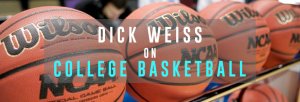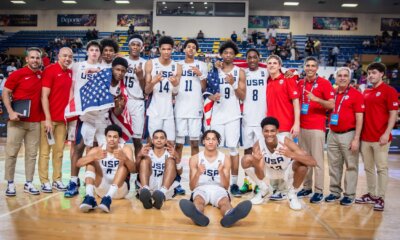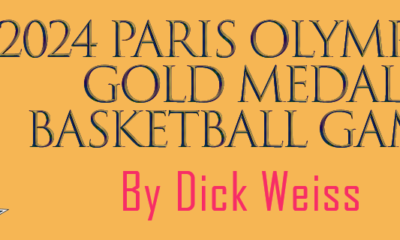
Dick Weiss on College Basketball
PHILADELPHIA- I can still remember the Saturday I spent in Pauley Pavilion in 2003 when UCLA named the court after John Wooden and his late wife Nell. Some 68 former Bruins’ players showed up
to honor the great college basketball coach. Among them was Kareem-Abdul Jabbar and Bill Walton.
At halftime, UCLA long time SID Mark Dellins took the media back into a backstage area where we had access to the three great pillars of the Bruins’ dynasty–the Wizzard, Kareem and Walton.
It was like listening to a verbal history of college basketball.
If Abbul-Jabbar was the greatest college player ever, Walton might have been IA, a bigger than life, most fundamentally sound college player of his generation.
Walton passed away today following a prolonged battle with cancer. He died surrounded by his wife Lori and sons Adam, Nate, Chris and Luke.
Walton was enshrined in the Naismith Hall of Fame in 1983. He led the Portland Trail Blazers to their only NBA championship in 1977 when the Blazers defeated the Philadelphia 76ers,4 games to 2, but he only played 468 games, averaging just 13.3 points and 10.5 rebounds in a pro career shortened by chronic foot injuries.
But he will always be known as a Bruin legend.
I was there to watch most of his biggest games in college in person as a young writer. I was there when he led UCLA to NCAA championships in 1972 and 1973 when he played his most famous game, scoring 44 points on 21 of 22 shooting in a near perfect game during an 87-65 win over Memphis State in St. Louis.
. During one timeout, UCLA guard Greg Lee asked Wooden about running another play so somebody else could score.
“Why,” Wooden said.
‘If it ain’t broke. don’t fix it.”
After the game the media went to the locker room to talk to Walton. Walton told everyone to wait while he showered and got dressed. Then, he blew right by the media without saying a word. That was Wooden at that time of his career– a rebellious, anti-war activist who had little or no time for the media. Part of the reason was that Waltpn had a stuttering problem and was uncomfortable answering questions. Besides, Walton was off to meet with Don Des Jardin, the GM of the 76ers, who had the first pick in the draft and members of the rival ABA, who both wanted Walton to leave college a year early.
The ABA basically wanted to give him his own franchise in Los Angeles and that he could pick his own teammates from all the other rosters in the league, with the exception of Julis Erving. But Walton didn’t want to leave Westwood. He had an idealistic view of the world and loved playing for Wooden where the Bruins never lost.
Wooden was a basketball purist and the one person who had influence over Walton in college.
Wooden was a great teacher who also wanted his players to adhere to a significant dress code that included keeping their hair at a reasonable length.
Before the start of his senior year, Walton showed up for picture day because his hair was too long.
Walton and Wooden talked about the subject with Walton suggesting players should be allowed to grow their hair as long as they wanted it.
“You feel strongly about this, do you,” Wooden said.
“Well, Bill I feel strongly about this particular rule too. So, we’re going to miss you, but it was nice having you here.”
End of discussion.
I was also there in South /Bend, the day Notre Dame broke UCLA’s 88-game winning streak the following season in 1974 and later when NC State and David Thompson defeated the Bruins in double overtime during the NCAA semi-finals in hostile Greensboro. Walton was so upset by the loss; he didn’t want to play in the third-place consolation
game. Wooden eventually convinced him to play. Walton attempted just three shots in 20 minutes during his final college game.
“At least I don’t have to cut my hair again,” he said.
Still his legacy lives off at Pauley Pavilion.
“It’s very hard to put into words what he has meant to UCLA’S program, as well as his tremendous impact on college basketball,” current UCLA coach Mick Cronin said. “Beyond his remarkable accomplishments as a player, it’s his relentless energy, enthusiasm for the game and unwavering candor that have been the hallmarks of his larger-than-life personality.
“As a passionate UCLA alumnus and broadcaster, he loved being around our players, hearing their stories and sharing his wisdom and advice. For me as a coach, he was
honest, kind and always had his heart in the right place. I will miss him very much. It’s hard to imagine a season in Pauley Pavilion without him.”
The first overall pick of the 1974 NBA draft by the Portland Trail Blazers, the 6-foot-11 Walton played 10 seasons in the NBA, winning championships with the Blazers in 1977 and the Boston Celtics in 1986. He averaged a double-double over his career, totaling 6,215 points (13.3 per game), 4,923 rebounds (10.5 per game), 1,034 blocks (2.2 per game) and 1,590 assists. A two-time All Star, he led the NBA in rebounding and blocks in 1977 and was the league’s Sixth Man of the Year in 1986.
There is no telling how good he might have been if he had stayed healthy. He’s a lot like Grant Hill in that respect.
After his NBA career, Walton turned to broadcasting and entertained generations of basketball fans, mixing commentary with tales of the Grateful Dead and the places he had visited in the Pacific Northwest. He started off doing NBA, then switched over to college basketball, calling the Pac-12 games for ESPN. He loved referring to the late conference as “The Conference of Champions.”
“In life, being so self-conscious, red hair, big nose, freckles and goofy, nerdy-looking face and can’t talk at all. I was incredibly shy and never said a word,” Walton told The Oregonian newspaper in 2017. “Then, when I was 28, I learned how to speak. It’s become my greatest accomplishment of my life and everybody else’s biggest nightmare.”
The last part of that was just Walton hyperbole. He was beloved for his on-air tangents.
He sometimes appeared on-air in Grateful Dead T-shirts; Walton was a huge fan of the band and referenced it often, even sometimes recording satellite radio specials celebrating what it meant to be a “Deadhead.”
Walton attended Dead concerts for 48 years. He counts them in the hundreds he was notorious for the tie-dye Grateful Dean T-shirts he used to wear during telecasts. In the
end, he was a celebration of life. Shine on, as he used to say.
“It doesn’t get any better than this,” he once said on a broadcast from Maui, tie-dyed T-shirt on, a Hawaiian lei around his neck.
“










